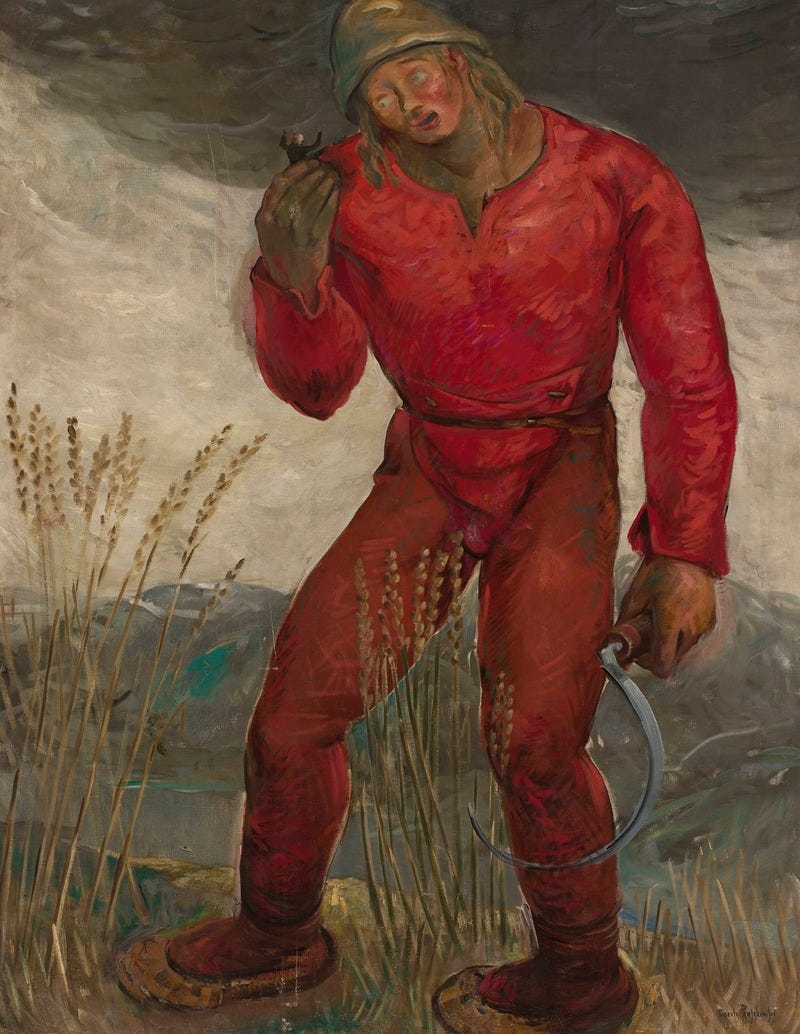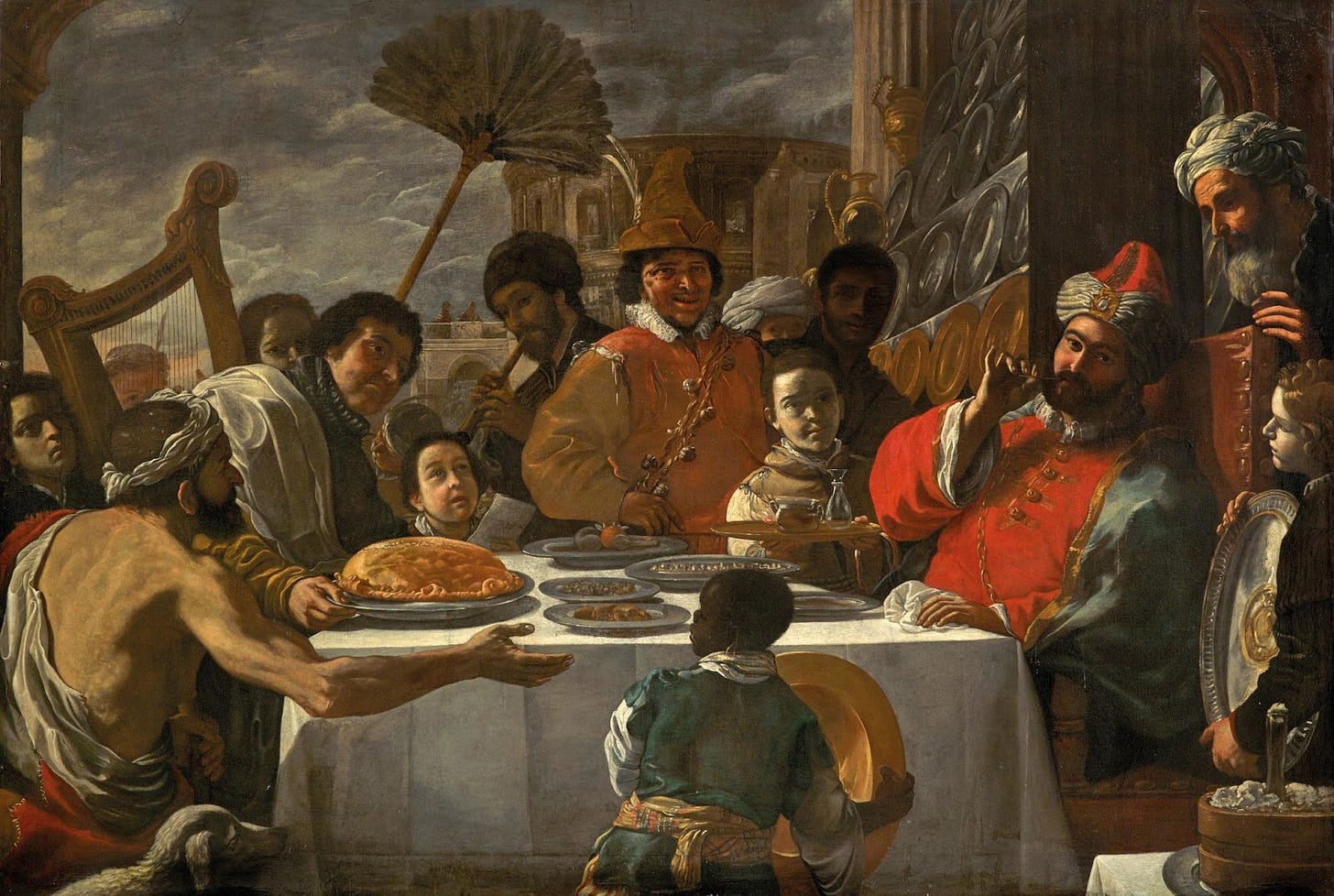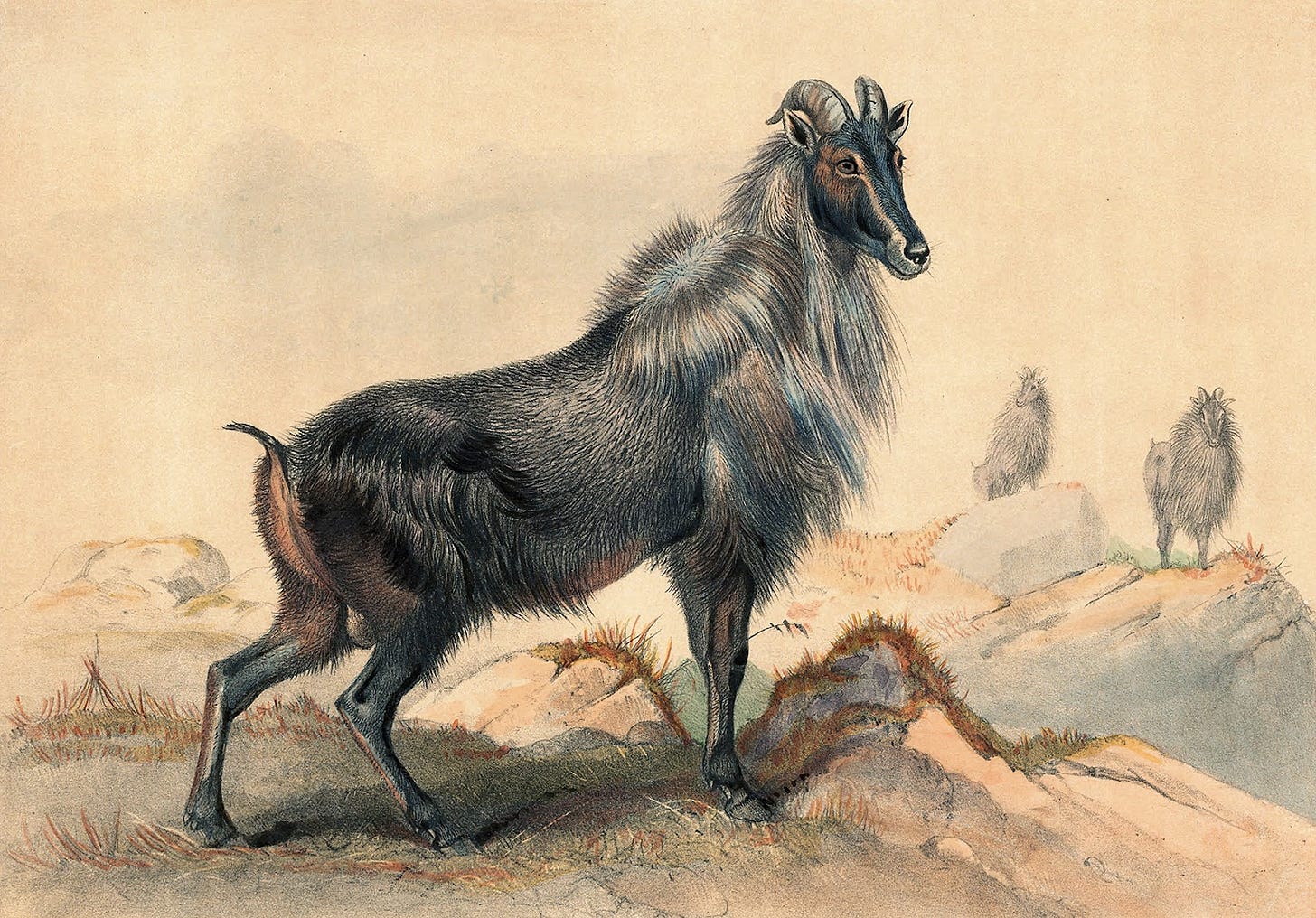“Big” is a weird word
Etymology and the limits of explanation
If you’ve been reading along for a while now, you may have noticed that many of the most common words in the English language are really quite weird when you start digging into their origins.
Everyday words like she, dog, and boy appear out of nowhere in English only in the late Middle Ages, like a stranger who wanders into town one day and before long inexplicably becomes the mayor.
Big is another one of these words.
If you’ve learned any of the close relatives of English, you may have noticed that none of their words for ‘big’ sound anything like ours.
For example, German has groß and Dutch has groot, both forms related to the English word great. The Scandinavian languages have stor, which does have an English equivalent stour, but you’ll only hear that in particular dialects. Even English’s in-laws, the Romance languages, have forms like grand or grande.
In fact, there’s nothing like big — at least nothing meaning ‘large’ — in any of the languages most closely tied to English.
Nor was there anything like big in Old English, the ancestor of today’s language, spoken from around AD 450–1100.
The typical word used in Old English to mean ‘big’ — as well as ‘great’ and ‘much’ — was micel, pronounced like the name Mitchell. There was also another word stor ‘big,’ which gave us the form stour, which we just saw above.
The word much is the modern descendant of micel,1 but it only preserves the part of the original meaning having to do with quantity. When it comes to meaning ‘great in size’, micel — and stor, for that matter — have been replaced by big.2
But big first appears in English around the year 1300 — as we’ve seen, seemingly without any connections to any other words in the language.
So we have another etymological mystery to solve: Where does the word big come from?
You're reading The Dead Language Society. I'm Colin Gorrie, linguist, ancient language teacher, and your guide through the history of the English language and its relatives.
Subscribe for a free issue every Wednesday, or upgrade to support my mission of bringing historical linguistics out of the ivory tower and receive two extra Saturday deep-dives per month.
If you upgrade, you’ll also be able to join our ongoing Beowulf Book Club. The next meeting takes place tomorrow: September 11 from 3:30–5:00pm Eastern. You can also catch up by watching our discussion of the first 915 lines (part 1, part 2) right away.
What’s the “big” deal?
The answer to this question, as far as scholars understand it,3 builds on a fact about early occurrences of the word big: they mostly occur in documents written in Northern and Midland dialects.
The earliest appearance of the word big is in Havelok the Dane, a romance written in the northeast Midlands around the year 1300:
Bernard stirt up, þat was ful big,
And caste a brinie up-on his rig.‘Bernard leapt up, who was very big,
And threw a coat of mail upon his back.’ (Havelok the Dane, 1774–1775)
I’ve italicized big in the translation because I want to avoid talking about the meaning of big in this passage for the moment.
For now, I want to dwell on this point: When a Middle English word shows up primarily in Northern (and East Midland) dialects, it’s often a clue that the word is Norse in origin. This is because the North and the East Midlands make up the bulk of the former Danelaw, the part of England ruled by Scandinavians — and, consequently, the site of lots of Scandinavian settlement — in the late 9th and early 10th centuries.
In these regions, Old Norse, the language of the Scandinavian rulers and settlers, was widely spoken. And the English spoken in those regions was heavily influenced by their Norse-speaking neighbours.
This influence remained long after people stopped speaking Old Norse: without it, we wouldn’t have many of the most familiar words in the English language, including egg, husband, and even they.
Although Norse settlement in England happened while Old English was spoken, rather than Middle English, we don’t see much Norse influence on English until centuries later, precisely because most of the English writing in the Old English period was done outside of the Danelaw. It’s only during the Middle English period that we get lots of writing in dialects influenced by Old Norse.
As people from all over England migrated to London in the late Middle Ages and Early Modern period, many of these Norse-derived features entered into standard English, that is, the English you’re reading right now.
When we look at these Norse-derived terms over the centuries, we see them start out in the north and east of England, from where they gradually move southwards until they find their way to London, and into the jumble of varieties of London speech, which would eventually come to form the basis of today’s standard forms of English.
This is exactly what happened with big. It started out in the former Danelaw and then moved south, just like many Norse loanwords into English.
But if big is a Scandinavian loanword, we should be able to point to a Norse source. And this is where things get a little murky.
Lifestyles of the big and the famous
Any living language is in a constant state of change. So when we look for some Scandinavian word that might have served as the origin of big, we need to consider that this word may have meant something other than ‘large.’ Which means we need to widen our search beyond words denoting great size.
Fortunately, the English word big helps us here. The earliest uses of big are all used to describe people, and don’t primarily mean ‘great in size’ but rather ‘great in strength.’ Here we can return to the Havelok quotation:
Bernard stirt up, þat was ful big,
And caste a brinie up-on his rig.‘Bernard leapt up, who was very strong,
And threw a coat of mail upon his back.’ (Havelok the Dane, 1774–1775)
It’s hard to disentangle bigness from strength, since the two often go hand in hand, but it’s clear from the uses of big in Middle English that it refers specifically to strength or heartiness rather than simply to size. Take, for example, these later quotations from Sir Thomas Malory, writing towards the end of the Middle English period in the 15th century:
The wayker knyght put the byggar knyght to a rebuke.
‘The weaker knight has defeated the stronger knight’ (Malory Wks.(Win-C), 484/21)
He was amended of hys syknes; and whan he was bygge and stronge, they toke their leve.
‘He was healed of his sickness; and when he was hearty and strong, they took their leave.’ (Malory Wks.(Win-C), 552/33)
In fact, big could also mean ‘rich’:
Now haf we or litel, now pas we mesur,
Now er we bigg, now er we bare‘Now we have too little, now beyond measure,
‘Now we’re rich, now we are poor.’ (Prik of Conscience, 1460)
This combination of meanings in a single word — both ‘strong’ and ‘rich’ — also appears in Old English, in the word rice (pronounced close to ‘reecheh’).
This is, partly at least, the ancestor of the Modern English word rich.4 There’s a logic to this combination: powerful people often use their power to gain great wealth, so it’s natural that one word should come to mean both things.
But the word rich eventually underwent semantic narrowing, losing its original meaning of ‘powerful.’ This happened in the Early Modern English period, and the last attestation of rich meaning ‘powerful’ occurs in the early 17th century.
So the word big, when it was first adopted into English, seems to have been more or less a synonym of rich, at least as it was understood at the time.
The eventual modern meaning of big, to refer even to objects that are large in size, appears to have developed through the intermediate meaning ‘grown up,’ which we still have today in phrases like big boy, big girl, etc. Since children become both larger and stronger as they grow up, the pathway of the word’s evolution is pretty clear.
But it’s not until 1444 that we see the first unambiguous usage of big to refer to an object that is not strong, but simply large. It occurs in a will, in which Sir Giles Daubeney left his son William, among other things, the following:
The biggest mattrassis.
‘The biggest mattresses’ (Testamenta Eboracensia, vol. II. 112)
So, given that ‘large’ is a later development of the word, we want to look in Scandinavian languages for a term that applies to a person, and means something like ‘strong’ or ‘powerful.’
Where the bugs big
The etymologist Anatoly Liberman cites Walter Skeat as the one who first found a somewhat promising lead: a Norwegian dialect form bugge ‘a mighty man,’ or the related adjective bugga ‘rich; powerful.’ But here, the vowel is not quite what we’d expect. An Old Norse form that would lead to Norwegian bugge would probably yield something like English bug.
Interestingly, an English word bug ‘powerful or pompous person’ does exist, and it has been argued that this bug — although not the form meaning ‘insect’ — comes from the same root as Norwegian bugge.
More promising, vowel-wise at least, is the Old Norse form byggja ‘dwell; build.’ This was actually borrowed into English too, as a verb big, also meaning ‘dwell; build.’ Unlike many other Norse-derived words, this verb big never made it into standard English and is in use only in Northern England, Scotland, and Ireland.
There may be a connection between bugge and byggja: when you have a y vowel in Old Norse, there are often related words with a u vowel in the same place. And the connection between being a dweller somewhere and being a powerful person isn’t overly hard to imagine, even if it isn’t the most direct.
So what are we left with? Two possible etymologies, one of which works well with the meaning of big and the other which works with the sound of big, and no clear way to connect the two. Slightly unsatisfying.
Other suggestions out there connect big to the Old Norse bokkr ‘billy goat,’ related to English buck — a common form of friendly address in Old Norse was bokki sæll, literally ‘happy he-goat’ — or to the Gothic word gabeigs ‘rich.’ But each of these has its issues, either with the form of the word or the meaning.5
Liberman also offers us another possibility, however. In his words:
It so happens that numerous b-g and p-g words all over Eurasia refer to bulky, fat, and inflated creatures and objects. Bag, bug, bog, pig, pug, and many other nouns belong here… Big was, most probably, coined in the north of England, and it may be native, one of the numerous b-g words referred to above. [src]
In my opinion, this explanation is also somewhat unsatisfying. By attributing the origin of the word to a form of spontaneous linguistic generation, we close the door to any further inquiry. If this is truly the case, big will always be a mystery: just another one of those b-g words.
In a way, it’s appropriate that the true origins of a word like big should be impossible to contain in a single hypothesis. If big is indeed a mystery, it’s precisely the kind of mystery that keeps the field interesting.
But, to me, this kind of explanation — saying big will always be a mystery — has to be a strategy of last resort.
As humans, we have a bias towards seeing order in nature, seeing the world as fundamentally explainable. Strangely enough, we’re often right: much about the world can in fact be explained. Science would be impossible otherwise. But this same drive to see order in the world around us also makes us see faces in clouds, electrical outlets, and pieces of toast.
Sometimes, in etymology as in life, there is no pattern: things just happen.
But, on balance, I’d prefer to keep wrestling with the bugge or byggja hypotheses, even if they’re nothing but the etymological equivalent of seeing Elvis on a piece of toast.
Who knows, we may uncover a new Middle English text one day or a form from an obscure Norwegian dialect that could solve the entire mystery.
I mean, it’s possible, right? Come on, dream big.
If you’re in Scotland or the North of England, you’ll hear that micel also survives as mickle or muckle, meaning ‘large’.
Large is also an option, but it at least has a clear ancestry: it’s a loanword from Old French large ‘wide; big.’
Here I build my case around the argument in the Oxford English Dictionary etymology of ‘big, adj.’
The modern English rich can also be said to descend from the Old French riche ‘rich; powerful.’ But French got the word riche from Frankish, which is itself a relative of Old English, so, in the end, rich is ultimately related to the Old English rice in two ways.
I won’t get into these issues here, but if you’re curious, Liberman discusses some of them in his article.






" . . . the etymological equivalent of seeing Elvis on a piece of toast." Sheer poetry, Colin!
Wonderful as always. I had to pause in the middle to look up amend. Mend (from an illness) always felt like Germanic to me but Amend is clearly Latin. E(x)mendare means to take out the faults, which fits both reweaving a fabric and reweaving your health. Right now I'm trying to amend a sickness, so the connection is especially helpful!